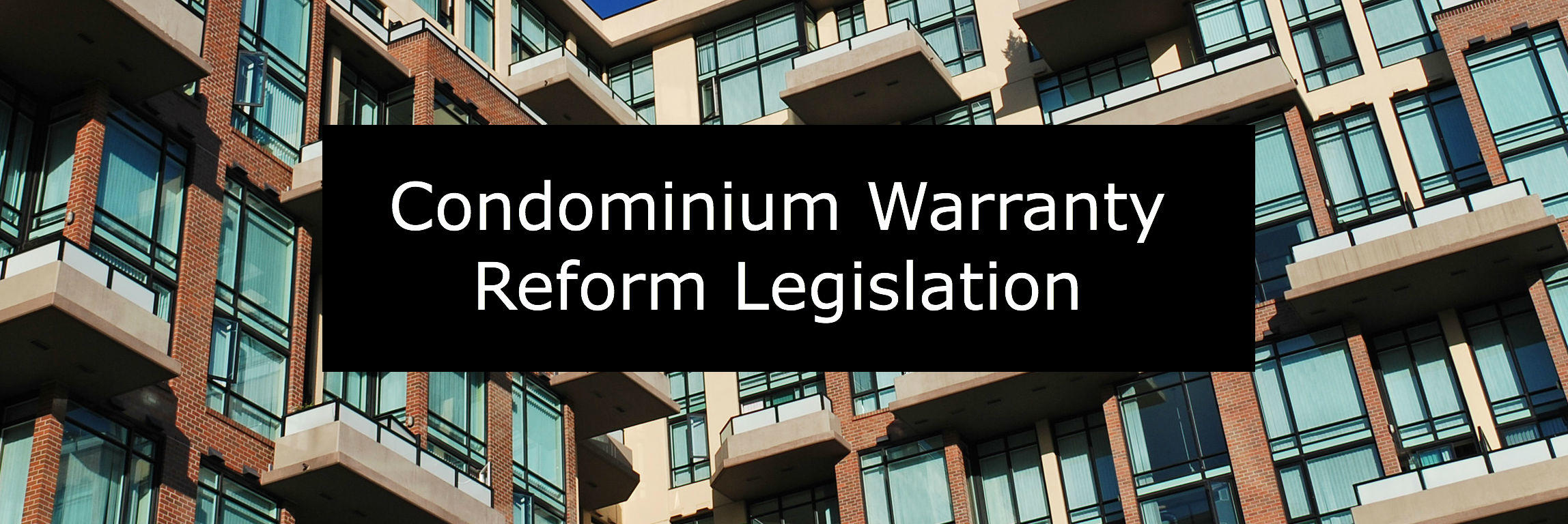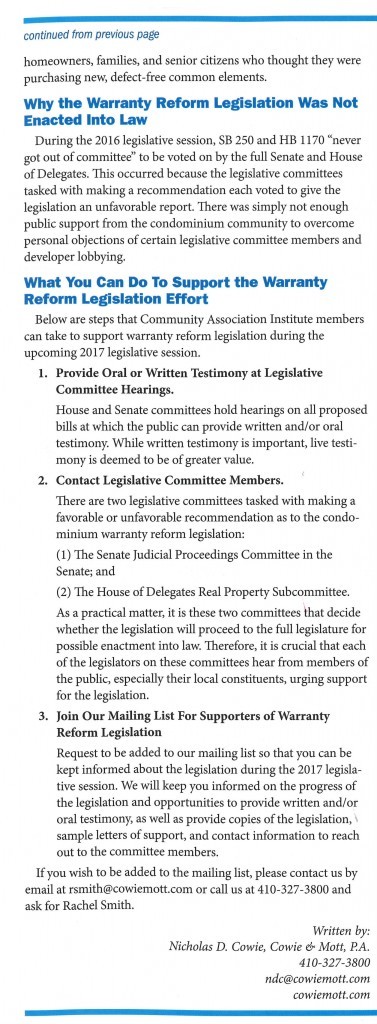Below is an Article concerning needed warranty reform legislation for condominiums. The legislation addresses unfair practices used by developers and builders to avoid their warranty responsibility for concealed construction defects in newly constructed condominiums they sell to the public. Recent efforts to get this legislation passed by the Maryland General Assembly have been unsuccessful, in part, due to a lack of vocal public involvement and attention to the issue.
This article explains how condominium owners and other members of the public can get involved in the effort to pass this important legislation that protects members of the public who purchase new condominiums with latent building code violations and other construction defects.
MARYLAND LEGISLATIVE UPDATE
Call to Action
PROPOSED CONDOMINIUM WARRANTY REFORM LEGISLATION
What you can do to help make it law
By Nicholas D. Cowie
This article pertains to needed condominium construction defect warranty reform legislation that the Maryland Legislature has been reluctant to enact into law. Below is an explanation of the legislation and a list of practical steps CAI members can take to support the legislation during the upcoming 2017 legislative session.
Background
The warranty reform legislation was unsuccessfully introduced during the 2016 legislative session as “Senate Bill 250” (“SB 250”) and “House Bill 1170” (“HB 1170”). Both bills were identical, one being filed in the Senate and the other in the House of Delegates.
What the Legislation is Designed to Achieve
The condominium warranty reform legislation (SB 250 and HB 1170) was intended to address three unfair practices used by condominium developers to prevent condominium associations from being able to make warranty claims for construction defects in newly constructed condominiums:
1. Developers Creating Associations Without Legal Authority to Enforce Warranty Claims.
SB 250 and HB 1170 would have closed a loophole under which developers attempt to create condominium associations that lack the legal power to enforce common element warranty claims.
2. Developers Shortening Time Periods for Bringing Warranty Defect Claims.
SB 250 and HB 1170 would have prohibited (with exceptions) developer attempts to shorten the normal statutory time period for making condominium warranty defect claims.
3. Developers Creating Governing Documents That Require Condominium Associations to Obtain Permission from Non-Unit Owners Before Making Warranty Claims.
SB 250 and HB 1170 would have prohibited developers from unilaterally creating governing documents that require a condominium association to obtain permission from third parties in order to make a warranty claim. For example, many developer-created governing documents today actually require an association to obtain written permission from each of the unit owners and their mortgage companies before making a common element warranty defect claim.
These unfair practices are, in essence, “self-interested director” actions because these offending provisions, designed to prevent condominium associations from making warranty claims, are adopted on behalf of the association while its board of directors is under developer control and made up of developer employees who are supposed to be acting in the best interest of the association. Throwing up road blocks to prevent a condominium from being able to make a common element warranty claims is not in the best interest of a condominium association and its members.
More importantly, the legislation would resolve an untenable “catch 22” situation where a condominium association that fails to make a timely warranty claim because of these unfair practices can then be sued by its members for not making a timely warranty claim. Greenstein v. Council of Unit Owners of Avalon Court Six Condominium, 201 Md. App. 186, 206 (2011) (holding that a condominium association could be sued by its unit owner members for failing to bring a timely warranty claim, and it was no defense that the board of directors could not obtain approval from all unit owners before initiating the claim).
Passage of this warranty reform legislation is important because when condominium associations are prevented from making common element warranty claims, the cost of the developer’s failure to build the condominium in accordance with applicable laws unfairly falls on the backs of first-time homeowners, families, and senior citizens who thought they were purchasing new, defect-free common elements.
Why the Warranty Reform Legislation Was Not Enacted Into Law
During the 2016 legislative session, SB 250 and HB 1170 “never got out of committee” to be voted on by the full Senate and House of Delegates. This occurred because the legislative committees tasked with making a recommendation each voted to give the legislation an unfavorable report. There was simply not enough public support from the condominium community to overcome personal objections of certain legislative committee members and developer lobbying.
What You Can Do To Support the Warranty Reform Legislation Effort
Below are steps that Community Association Institute members can take to support warranty reform legislation during the upcoming 2017 legislative session.
-
Provide Oral or Written Testimony at Legislative Committee Hearings.
House and Senate committees hold hearings on all proposed bills at which the public can provide written and/or oral testimony. While written testimony is important, live testimony is deemed to be of greater value.
-
Contact Legislative Committee Members.
There are two legislative committees tasked with making a favorable or unfavorable recommendation as to the condominium warranty reform legislation:
(i) The Senate Judicial Proceedings Committee in the Senate; and
(ii) The House of Delegates Real Property Subcommittee.
As a practical matter, it is these two committees that decide whether the legislation will proceed to the full legislature for possible enactment into law. Therefore, it is crucial that each of the legislators on these committees hear from members of the public, especially their local constituents, urging support for the legislation.
- Join Our Mailing List For Supporters of Warranty Reform Legislation
Request to be added to our mailing list so that you can be kept informed about the legislation during the 2017 legislative session. We will keep you informed on the progress of the legislation and opportunities to provide written and/or oral testimony, as well as provide copies of the legislation, sample letters of support, and contact information to reach out to the committee members.
If you wish to be added to the mailing list please contact us by email at rsmith@cowielawgroup.com or call us at 410-327-3800 and ask for Rachel Smith.
Note about Author: Nicholas D. Cowie is a partner in the law firm of Cowie Law Group, P.C. and is the author of the condominium warranty reform legislation discussed in the article above. Mr. Cowie has led the effort to address these and other unfair practices that adversely affect Maryland condominium unit owners.
Mr. Cowie also drafted and led the effort to pass earlier reform legislation that addressed practices used by developers and builders to prevent Condominium Associations and HOA (Homeowners Associations) and their members from being able to bring warranty claims when they sold new condominiums with concealed construction defects. Click to see Article on House Bill 597. This new proposed legislation is needed to addresses new unfair practices being used by developers and builders that harm purchasers of newly constructed communities in Maryland.



